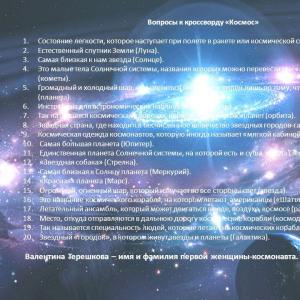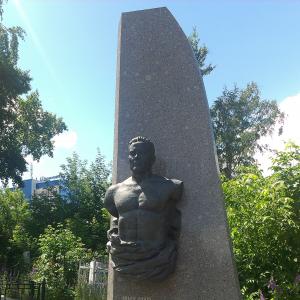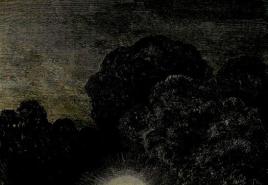“The gloomy guardian of the muses” according to Pushkin. Message to the Censor Analysis of Pushkin’s poem “Message to the Censor”
Gloomy guardian of the muses, my longtime persecutor,
Today I decided to reason with you.
Don’t be afraid: I don’t want to, seduced by a false thought,
Censorship is blasphemed by the careless;
What London needs is too early for Moscow.
We have writers, I know what they are like;
Their thoughts are not crowded by censorship,
And a pure soul is right before you.First of all, I sincerely confess to you,
I often regret your fate:
Sworn interpreter of human nonsense,
Khvostova, Bunina’s only reader,
You are forever obliged to sort out your sins
Either stupid prose, or stupid poetry.
Russian authors are not easily alarmed:
Who will translate an English novel from French,
He will compose an ode, sweating and groaning,
Another tragedy will write to us jokingly -
We don't care about them; and you read, get mad,
Yawn, fall asleep a hundred times - and then sign.So, the censor is a martyr; sometimes he wants
Refresh your mind with reading; Rousseau, Voltaire, Buffon,
Derzhavin, Karamzin beckon with his desire,
And must devote fruitless attention
To the new nonsense of some liar,
Whose leisure is to sing of groves and fields,
Yes, the connection has been lost in them, look for it from the beginning,
Or erase it from a skinny magazine
Rough ridicule and vulgar language,
Polite wits an intricate tribute.But the censor is a citizen, and his rank is sacred:
He must have a direct and enlightened mind;
He is accustomed to honoring the altar and the throne with his heart;
But opinions do not crowd and reason tolerates him.
Guardian of silence, decency and morals,
He himself does not violate the written regulations,
Devoted to the law, loving the fatherland,
Knows how to take responsibility;
It does not block the path of useful truth,
Living poetry does not interfere with frolic.
He is a friend to the writer, he is not a coward,
Prudent, firm, free, fair.And you, fool and coward, what are you doing to us?
Where you should be thinking, you blink your eyes;
Without understanding us, you dirty and tear;
You call white black on a whim;
Satire by libel, poetry by debauchery,
The voice of truth by rebellion, Kunitsyn by Marat.
I decided, and then go ahead and ask for it.
Say: isn’t it a shame that in holy Rus',
Thanks to you, we haven’t seen books yet?
And if they talk about business,
Then, loving Russian glory and sound mind,
The Emperor himself orders it to be published without you.
We are left with poems: poems, triplets,
Ballads, fables, elegies, couplets,
Leisure and love, innocent dreams,
Imagination minute flowers.
O barbarian! which of us, the owners of the Russian lira,
Didn’t curse your destructive axe?
Like a tiresome eunuch you wander among the muses;
Neither ardent feelings, nor the brilliance of the mind, nor taste,
Not the syllable of the singer Pirov, so pure, noble -
Nothing touches your cold soul.
You cast a sidelong, wrong glance at everything.
Suspecting everything, you see poison in everything.
Perhaps leave the work, which is not at all commendable:
Parnassus is not a monastery or a sad harem,
And rightly never a skilled farrier
He did not deprive Pegasus of excessive ardor.
What are you afraid of? Believe me, whose fun is
To ridicule the law, the government, or morals,
He will not be subject to your punishment;
He is not familiar to you, we know why -
And his manuscript, without perishing in Lethe,
Without your signature he walks around in the light.
Barkov didn’t send you any humorous odes,
Radishchev, enemy of slavery, escaped censorship,
And Pushkin’s poems were never published;
What needs? Others have read them anyway.
But you carry yours, and in our wise age
Shalikov is hardly a harmful person.
Why are you tormenting yourself and us for no reason?
Tell me, have you read Catherine’s Order?
Read it, understand it; you will see clearly in him
Your duty, your rights, you will go a different way.
In the eyes of the monarch, the satirist is excellent
Ignorance was executed in folk comedy,
Even in the narrow head of a court fool
Kuteikin and Christ are two equal persons.
Derzhavin, the scourge of nobles, at the sound of the menacing lyre
Their proud idols exposed them;
Chemnitzer spoke the truth with a smile,
Darling's confidant joked ambiguously,
Cyprus sometimes appeared without a veil -
And censorship did not interfere with any of them.
You are frowning; admit it, these days
Wouldn't they have gotten rid of you so easily?
Who is to blame for this? there is a mirror in front of you:
The Alexandrov days are a wonderful start.
Check out what the seal produced in those days.
We cannot retreat in the field of the mind.
We are righteously ashamed of ancient stupidity,
Can we really look back to those years again?
When no one dared to name the fatherland,
And did both people and the press crawl in slavery?
No no! it has passed, a destructive time,
When Russia bore the burden of Ignorance.
Where the glorious Karamzin won his crown,
The censor there can no longer be a fool...
Correct yourself: be smarter and make peace with us.“It’s all true,” you say, “I won’t argue with you:
But can a censor judge according to his conscience?
I must spare this and that.
Of course, you find it funny, but I often cry,
I read and get baptized, I scribble at random -
There is fashion and taste for everything; it happened, for example,
We have great honor in Bentham, Rousseau, Voltaire,
And now Milot has fallen into our net.
I am a poor man; besides, a wife and children..."Wife and children, friend, believe me, are a great evil:
Everything bad happened to us from them.
But there is nothing to do; so if it's impossible
You should quickly get home carefully,
And the king needs you with your service,
At least get yourself a smart secretary.
Analysis of Pushkin’s poem “Message to the Censor”
Pushkin’s legacy has preserved for history the names of officials who censored the literary works of the author and his contemporaries. In a small list, the name A.S. stands out. Birukov, to whom two poetic messages are dedicated. The first, written in 1822, is close to a pamphlet in its satirical pathos. In the second of the texts, which appeared two years later, soft irony and conciliatory intonations replace sarcasm. Lyrical hero admits that in a previous address he lost his temper and “spoke a little loudly.” What did he have to apologize for?
The beginning of the first “Message” is revealed: the addressee receives the dubious title of the stern “guardian of the Muses” and an equally unflattering description of the oppressor, “persecutor”. The hero-poet is not going to speak out against censorship as such, putting his thought into an ironic aphorism. Not all European innovations will take root on Russian soil, and writers take into account the peculiarities of the domestic mentality.
By nature of service, an official should carefully study second-rate works of art. The uninteresting, boring responsibilities that the addressee has undertaken evoke the sympathy of the lyrical “I.” Creating a comical image of a “martyr” censor, the mocking author leaves caustic remarks regarding the meaningless creations of his contemporaries deprived of talent.
The ideal image of a censor, an enlightened citizen and a convinced patriot, is created in the fourth stanza. It represents the golden mean: by observing the laws, an honest employee does not hinder, but promotes the development of the literary process. Summarizing positive qualities“a friend to the writer,” the poet uses five homogeneous predicates, expressed by short adjectives.
The image of a real official is far from an ideal portrait. The content of the fifth stanza is replete with pejorative characteristics. Among the disapproving assessments, images painted with oriental flavor stand out. The picky performer is compared to an annoying eunuch guarding a “sad harem.” The fragment ends with an edifying remark: the addressee should be smarter, braver and more forgiving.
The poet models the exculpatory speech of a censor - a timid man, crushed by life's circumstances and fearful of the authorities' wrath.
The poem ends with an arrogant remark from the subject of speech, which contains allusions that refer the reader to Krylov’s fable. If the recipient cannot leave his post, then he should surround himself with smart assistants who correct the mistakes of their patron.
Gloomy guardian of the muses, my longtime persecutor, Today I decided to reason with you. Don’t be afraid: I don’t want, seduced by a false thought, to vilify the Censorship with careless blasphemy; What London needs is too early for Moscow. We have writers, I know what they are like; Their thoughts are not crowded by censorship, And a pure soul is right before you. First, I sincerely confess to you, I often regret your fate: A sworn interpreter of human nonsense, Khvostova, Bunina’s only reader, You are forever obliged to sort out sins, Either stupid prose, or stupid poetry. Russian authors are not easily alarmed: Whoever translates an English novel from French will compose an ode, sweating and groaning, Another will write us a tragedy jokingly - We don’t care about them; and you read, get mad, yawn, fall asleep a hundred times - and then sign. So, the censor is a martyr; sometimes he wants to refresh his mind with reading; Rousseau, Voltaire, Buffon, Derzhavin, Karamzin beckon his desire, And he must devote fruitless attention to the new nonsense of some liar, Whose leisure is to sing groves and fields, But having lost the connection in them, look for it from the beginning, Or erase it from a skinny magazine Ridicule rude and vulgar abuse, polite wits, intricate tributes. But the censor is a citizen, and his rank is sacred: He must have a direct and enlightened mind; He is accustomed to honoring the altar and the throne with his heart; But opinions do not crowd and reason tolerates him. The guardian of silence, decency and morals, does not violate the written regulations, devoted to the law, loving the fatherland, knows how to take responsibility upon himself; It does not block the path of useful truth, It does not prevent living poetry from frolicking. He is a friend to the writer, he is not a coward before the nobility, he is prudent, firm, free, and fair. And you, fool and coward, what are you doing to us? Where you should be thinking, you blink your eyes; Without understanding us, you dirty and tear; You call white black on a whim; Satire is a lampoon, poetry is debauchery, The voice of truth is rebellion, Kunitsyn is Marat. I decided, and then go ahead and ask for it. Tell me: isn’t it a shame that in holy Rus', thanks to you, we don’t see books until now? And if they think about business while talking, then, loving Russian glory and sound mind, the Emperor himself orders it to be published without you. We are left with poems: poems, triplets, Ballads, fables, elegies, couplets, innocent dreams of leisure and love, momentary flowers of imagination. O barbarian! Which of us, the owners of the Russian lira, did not curse your destructive axe? Like a tiresome eunuch you wander among the muses; Neither ardent feelings, nor the brilliance of the mind, nor taste, nor the syllable of the singer of the Feasts, so pure, noble - Nothing touches your cold soul. You cast a sidelong, wrong glance at everything. Suspecting everything, you see poison in everything. Perhaps leave the work, which is not at all commendable: Parnassus is not a monastery or a sad harem, And the skillful farrier never deprived Pegasus of his excessive ardor. What are you afraid of? Believe me, whose amusements are to ridicule the law, the government, or morals, He will not be subject to your punishment; He is not familiar to you, we know why - And his manuscript, without perishing in Summer, walks around in the world without your signature. Barkov did not send you humorous odes, Radishchev, the enemy of slavery, escaped censorship, And Pushkin’s poems were never published; What needs? Others have read them anyway. But you carry your own, and in our wise age Shalikov is hardly a harmful person. Why are you tormenting yourself and us for no reason? Tell me, have you read Catherine’s Order? Read it, understand it; you will clearly see in him your duty, your rights, you will go a different way. In the eyes of the monarch, the excellent satirist executed Ignorance in a folk comedy, Although in the narrow head of the court fool, Kuteikin and Christ are two equal faces. Derzhavin, the scourge of nobles, at the sound of the menacing lyre, exposed their proud idols; Chemnitser spoke the truth with a smile, Dushenka’s confidant joked ambiguously, sometimes appeared to Cyprus without a veil - And censorship did not interfere with any of them. You are frowning; Admit it, these days they wouldn’t get rid of you so easily? Who is to blame for this? there was a mirror in front of you: The Alexandrov days are a wonderful beginning. Check out what the seal produced in those days. We cannot retreat in the field of the mind. We are righteously ashamed of the ancient stupidity. Will we really turn back to those years, When no one dared to name the fatherland, And both people and the press crawled in slavery? No no! it has passed, the destructive time, When Russia bore the burden of Ignorance. Where the glorious Karamzin won his crown, There a fool can no longer be a censor... Correct yourself: be smarter and make peace with us. “It’s all true,” you say, “I won’t argue with you: But can a censor judge according to his conscience? I must spare this one and that one. Of course, you find it funny - but I often cry, I read and get baptized, I smear at random - On everything is fashion, taste; it happened, for example, Bentham, Rousseau, Voltaire were in great honor, and now Milot has fallen into our snares; besides, I have a wife and children...” Wife and children, friend, Believe me, it’s a great evil: Everything bad happened to us from them. But there is nothing to do; So if it is impossible for you to get home quickly and carefully, and the king needs you for your service, at least take a smart secretary.“The gloomy guardian of the muses” according to Pushkin
The first letter is "c"
Second letter "e"
Third letter "n"
The last letter of the letter is "r"
Answer to the question ""The gloomy guardian of the muses" according to Pushkin", 6 letters:
censor
Alternative crossword questions for the word censor
IN Ancient Rome official in charge of conducting qualifications and monitoring the behavior and political reliability of citizens
"smoothing" text
To whom does A. S. Pushkin address: “Gloomy guardian of the muses, my longtime persecutor”
Guardian of Reliability
In ancient Rome, the highest elected officials who were in charge of qualifications, managed the state. property, observing morals, etc.
"gloomy guardian of the muses"
Definition of the word censor in dictionaries
Wikipedia
Meaning of the word in the Wikipedia dictionary
A censor was an official in Ancient Rome who primarily carried out the census. The position was established in 443 BC. e. initially to regulate taxes and military service. In 434 BC. e. five-year term of service of the censor at the suggestion of...
Encyclopedic Dictionary, 1998
The meaning of the word in the dictionary Encyclopedic Dictionary, 1998
CENSOR (lat. censor) in Ancient Rome, an official who carried out qualifications, control over public finances, supervision over morals, public construction, etc. The person who carries out censorship.
New explanatory dictionary of the Russian language, T. F. Efremova.
The meaning of the word in the dictionary New explanatory dictionary of the Russian language, T. F. Efremova.
m. Censorship official (1). trans. decomposition Someone who strictly controls something. The official who led the census (4) in Ancient Rome.
Examples of the use of the word censor in literature.
One day August as censor reprimanded several rich Romans for allowing their wives to hang themselves with jewelry.
When censors were strict beyond all measure, editor Blagosvetlov had to print five to six times more pages than necessary - 150, or even 180 instead of 30.
His grandfather was the manager of the estates of Augustus, and his father, Lucius Vitellius, reached the highest positions: he was consul three times and once censor, but became more famous for his incredible flattery.
But it was no less important for German intelligence what Zilber as censor got the opportunity to report those addresses in neutral countries that attracted the attention of the British.







